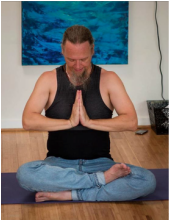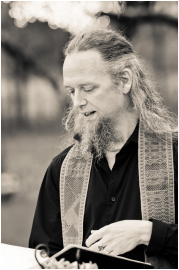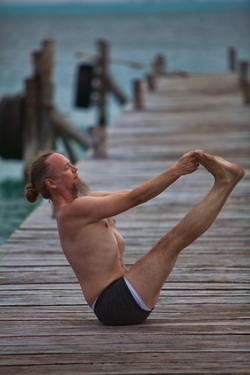As I indicated in my prior post, I had the opportunity to study the Yoga Sutras of Patanjali all weekend - the study was in the classic form of learning the Invocation as well as the first dozen Sutras through call and response and repitition. Then, we delved into the concepts and the philosophy.
The persistence of memory... I, like many I suppose, share that concern of 'reacting from memory' rather than 'acting from insight or clarity' of the present situation. We all 'time-travel'. For instance, when we fall into the trap of arguing, we are rarely emotionally involved in the actual issue at hand, but rather time-traveling to all of our prior conflicts, arguments, disappointments and unresolved anger with the 'other' or 'others'. It's a rare person who can actually stop that momentum and pose the question "What are we really talking about here?".
And, when we are uncertain, or in conflict, often the voices from the 'committtee in our head' are those from the past; again, the memory, which taints our experience of the present by casting it's pall over the action and flavoring the reaction.
So, is our goal to ablute the memory, to completely forget who we were before we became yogis?? No, not at all, and Sutra I.11 tells us we cannot erase or eradicate the memory. But we can 'overcome it' and tame it, or yoke that wild beast.
First, the Sutra: it's primarily definitional, it tells us what "smrtayah" is - one of the five 'vrrtis' or states of perception, as listed in I.6. It is our collection of life experiences, or memory. Of "smrtayah," or "smrtih" as it conjugates, Patanjali says: "anubhutavisaya-asampramosah-smrtih". Let's break it down:
anubhutavisaya: anu = following, or to follow; bhuta = a thing or a being; visaya = an object. We construct this to mean 'perceptions'. Let's say "following the existence of an object or thing" or perhaps more clearly "the record of our experience" (something that is evident to us, something we perceive).
asampramosah: a = not; sam = completely; pramosah = can be thieved, or stolen, or taken. Shall we say, "completely unthievable" or "untakeable". That means we cannot have our memories taken from us (short of head or associated trauma), but rather in the course of life our experiences are ours and we carry them as records.
smrtih: the word to be defined, and by such preceding statements, "The Completely Untheivable Record of our Experiences is What we Call Smrtih or Memory." Thus, Patanjali sets the stage and clearly says, we cannot give them away, they can't even be stolen; therefore, we must own and recognize our memory.
Memory is one of the 'false perceptions' when it comes to using our yoga to seek clarity - our rememberances, both of sweetness and sorrow, come into our perceptions on the record of memory, and by my example above, we might find ourselves having that fight, just one more time - "I mean, it's only been like five years now, how would I ever get over it..." We might have one statement from our family time-travel us back to our youth, or a time of diminished self-esteem, of shame or a time of isolation. I think this is called 'going home for the holidays' for some!
So, we can't get rid of memory, and if they are entirely unthievable, then they are ours for a reason. We don't want to forget the past, but rather to know what our true perceptions are. So, memory is great when it comes to what kinds of mushrooms to eat or not eat... memory is a trickster when it comes to remaining present to ourselves and our actions, and not coming from a place of projection and reaction!
Tough work, eh yogis?? Well, the good news is that with clarity comes the ability to know when the "smrtih" is talking and what it is saying. And, for yogis, the place we find clarity is through focus. The place we find focus is in our practice - asana, pranayama, meditation, etc. So, if you want to address the past so you don't keep bringing it into the present and stalling the glory of the future, hit your practice.
It wasn't because P Jois had limited English, though he did; it's not because he taught Asthanga Vinyasa, because he did - but the reason he would answer universally with 'Practice!' was that this is where focus presents, and focus creates clarity and clarity keeps us present, even against the attractive trap of the mind, memory, and time-travel.
Thus, if you've got something troubling you - practice. If you are repeating patterns and poor or unfulfilling relationships - practice. When you need to know what to do - practice.
"Practice and all is coming." What is all? All is clarity. The rest is you using that to make better and better choices and to stay present to yourself and with everyone else.
We have an elegant, complete, philosophical science that enables us not to become saints and liberate as the goal, but rather to live a more present, clear and purpose-filled life as the human creatures we are. Here, at this time, in this world, with these obstacles and tools. Will we achieve it? Perhaps, if we are willing to fail and then start over and learn and get clear - that's why they call it "Practice".
Give thanks and praise - everyone has memories, few are given tools to tame them!



